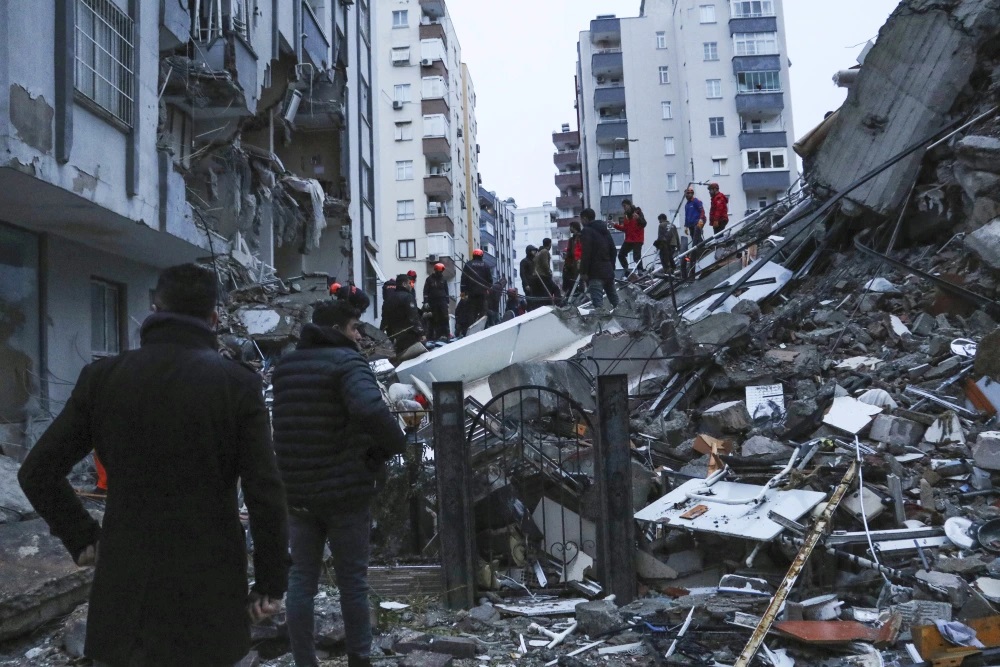Second massive quake strikes after first kills over 1500 across south-eastern Turkey and northern Syria
A second powerful earthquake has rocked Turkey as the death toll from an earlier shock passes 1500 across the transcontinental country and neighbouring Syria.
The second quake hit central Turkey on Monday afternoon (9.24pm AEDT) at magnitude 7.5 and a depth of 10 kilometres, according to the US Geological Survey.
The centre of the tremor was about four kilometres out of Ekinözü to the north-east of the earlier earthquake. The damage and death toll from the latest tremor is unknown.

Orhan Tatar, an official from the Turkish disaster agency, told reporters the two quakes were independent of each other.
He said hundreds of aftershocks were expected after both.
The second tremor was felt as far as the eastern Mediterranean island nation of Cyprus, where people took to social media to post footage of swaying curtains, while employees working in some high-rise buildings in the capital, Nicosia, quickly rushed outside.
Earlier on Monday, a powerful 7.8 magnitude earthquake rocked south-eastern Turkey and northern Syria, toppling some 3000 buildings.
Hundreds are still believed to be trapped under rubble, and the toll is expected to rise as rescue workers searched mounds of wreckage in cities and towns across the area.

It’s not believed any Australians have been impacted by the devastation in the region.
“At this stage, the Department of Foreign Affairs and Trade is not aware of any Australian casualties in the region,” a statement issued on Monday night said.
“We continue to monitor the situation closely with our missions in Ankara, Istanbul, and Beirut.
“Australians affected by the earthquake and its aftershocks are advised to follow the directions of local authorities.”
Prime Minister Anthony Albanese said all Australians were “deeply saddened by the tragic loss of life and terrible devastation”
International emergency response underway
Turkish President Recep Tayyip Erdogan said offers for help had been received from some 45 countries in the aftermath of the deadly earthquake, as the powerful aftershocks continued.
In a televised address, Erdogan announced Turkey’s death toll had reached 912, adding about 5400 people were injured, while about 2470 people were rescued from collapsed structures.
“Because the debris-removal efforts are continuing in many buildings in the earthquake zone, we do not know how high the number of dead and injured will rise,” Erdogan said.
“Our hope is that we recover from this disaster with the least loss of life possible.”
The World Health Organisation is among those helping in the massive international effort, they said on Monday.
Hans Kluge, head of the WHO in Europe, said regional offices of the United Nations agency in the eastern Mediterranean were assisting the expanding international effort to swiftly transport medicine and relief equipment to quake-hit areas.
Similarly, the European Union’s top foreign policy official said ten member states are providing urban search and rescue teams to help Turkey deal with massive earthquake damage.

In a joint statement, High Representative Josep Borrell and the EU Commissioner for Crisis Management, Janez Lenarcic said teams have been mobilised from Bulgaria, Croatia, the Czech Republic, France, Greece, Hungary, Malta, the Netherlands, Poland, Romania to support the first responders on the ground.
Italy, Spain, and Slovakia have offered their rescue teams to Turkey as well.
They said the EU’s Copernicus satellite system had also been activated to provide emergency mapping services.
Greece and the Czech Republic announced details of their rescue missions, and are sending rescuers, rescue dogs, specialised vehicles, structural engineers, doctors and seismic planning experts.

Greek Prime Minister Kyriakos Mitsotakis expressed “deep sorrow” over the earthquake, adding that Greece is “placing all our rescue forces at Turkey’s disposal depending on what else they may ask us for.”
A spokesperson for the Lebanese Red Cross told The Associated Press that Lebanon’s government is sending a team consisting of Lebanese army soldiers, Red Cross and Civil Defense first responders, and firefighters to Turkey to help with its rescue efforts.
NATO Secretary General Jens Stoltenberg said members of the alliance were mobilising support to help Turkey deal with the aftermath of the devastating earthquakes.
Stoltenberg expressed “full solidarity with our ally Turkey in the aftermath of this terrible earthquake”.
In a tweet, Stoltenberg said he was in contact with Erdogan and Foreign Minister Mevlut Cavusoglu. Several NATO members have already said they are planning to send support to help victims of the earthquake in Turkey and Syria.
Russia says it is readying rescue teams to fly to Turkey and Syria. A minister of emergency situations, Aleksandr Kurenkov, said teams of 100 search and rescue personnel were on standby.
Russian President Vladimir Putin also offered condolences in telegrams to the leaders of Syria and Turkey and expressed readiness to help.
In the telegram made public by the Kremlin, Putin said Russia is ready to “provide the necessary assistance” and offered his “profound condolences on the numerous fatalities and massive destruction caused by a powerful earthquake in your country.”

The Russian president also conveyed “sincere sympathy and support to the families of the deceased and wishes of a speedy recovery to everyone injured in this calamity.”
Japan’s Foreign Ministry says the country is sending a group of about 75 rescue workers to Turkey to help in search and rescue operations.
Separately, the Swiss rescue dog service REDOG said it is preparing to send 22 rescuers with 14 dogs to the earthquake-hit region of Turkey.
First deadly quake struck as people slept
On both sides of the border, residents jolted out of sleep by the pre-dawn quake rushed outside on a cold, rainy and snowy winter night, as buildings were flattened and strong aftershocks continued.
Rescue workers and residents in multiple cities searched for survivors, working through tangles of metal and giant piles of concrete.
A hospital in Turkey collapsed and patients, including newborns, were evacuated from a handful of facilities in Syria.

In the Turkish city of Adana, one resident said three buildings near his home collapsed. “I don’t have the strength anymore,” one survivor could be heard calling out from beneath the rubble as rescue workers tried to reach him, said the resident, journalism student Muhammet Fatih Yavus.
Farther east in Diyarbakir, cranes and rescue teams rushed people on stretchers out of a mountain of pancaked concrete floors that was once an apartment building.
The quake, felt as far away as Cairo, was centered north of Gaziantep, a Turkish provincial capital.
It struck a region that has been shaped on both sides of the border by more than a decade of civil war in Syria.

On the Syrian side, the swath affected is divided between government-held territory and the country’s last opposition-held enclave, which is surrounded by Russian-backed government forces. Turkey, meanwhile, is home to millions of refugees from that conflict.
The opposition-held regions in Syria are packed with some four million people displaced from other parts of the country by the fighting. Many of them live in buildings that are already wrecked from past bombardments.
Hundreds of families remained trapped in rubble, the opposition emergency organisation, called the White Helmets, said in a statement.

Strained health facilities and hospitals were quickly filled with wounded, rescue workers said. Others had to be emptied, including a maternity hospital, according to the SAMS medical organisation.
“We fear that the deaths are in the hundreds,” Muheeb Qaddour, a doctor, said by phone from the town of Atmeh.
Turkey sits on top of major fault lines and is frequently shaken by earthquakes. Some 18,000 were killed in powerful earthquakes that hit northwest Turkey in 1999.
The US Geological Survey measured Monday’s first quake at 7.8. At least 20 aftershocks followed, some hours later during daylight.

Buildings were reported collapsed in a wide area extending from Syria’s cities of Aleppo and Hama to Turkey’s Diyarbakir, more than 330 kilometres to the northeast.
Nearly 900 buildings were destroyed in Turkey’s Gaziantep and Kahramanmaras provinces, said Vice President Fuat Oktay.
A hospital collapsed in the Mediterranean coastal city of Iskanderoun, but casualties were not immediately known, he said.
“Unfortunately, at the same time, we are also struggling with extremely severe weather conditions,” Oktay told reporters.
Nearly 2,800 search and rescue teams have been deployed in the disaster-stricken areas, he said.
“We hope that we will get through this disaster together as soon as possible and with the least damage,” Turkish President Recep Tayyip Erdogan wrote on Twitter.
Countries from Taiwan to Russia to Germany offered to send help, whether medical supplies, search teams or money.
In Turkey, people trying to leave the quake-stricken regions caused traffic jams, hampering efforts of emergency teams trying to reach the affected areas. Authorities urged residents not to take to the roads.
Mosques around the region were being opened up as a shelter for people unable to return to damaged homes amid temperatures that hovered around freezing.
The quake heavily damaged Gaziantep’s most famed landmark, its historic castle perched atop a hill in the center of the city.

Parts of the fortresses’ walls and watch towers were leveled and other parts heavily damaged, images from the city showed.
In Diyarbakir, hundreds of rescue workers and civilians formed lines across a mountain of wreckage, passing down broken concrete pieces, household belongings and other debris as they searched for trapped survivors while excavators dug through the rubble below.
In northwest Syria, the quake added new woes to the opposition-held enclave centered on the province of Idlib, which has been under siege for years, with frequent Russian and government airstrikes.

The territory depends on a flow of aid from nearby Turkey for everything from food to medical supplies.
The opposition’s Syrian Civil Defense described the situation there as “disastrous,” adding that entire buildings have collapsed and people are trapped under the rubble.
In the small Syrian rebel-held town of Azmarin in the mountains by the Turkish border, the bodies of several dead children, wrapped in blankets, were brought to a hospital.

The USGS said the quake was centered about 33 kilometres from Gaziantep. It was 18 kilometres deep.
The death toll in government-held areas of Syria climbed to 326 people, with some 1,000 injured, according to the Health Ministry.
In rebel-held areas, at least 150 people were killed, according to the White Helmets, though the SAMS medical organisation put the toll at 106; both said hundreds were hurt.
In Damascus, buildings shook and many people went down to the streets in fear. The quake jolted residents in Lebanon from beds, shaking buildings for about 40 seconds.

Many residents of Beirut left their homes and took to the streets or drove in their cars away from buildings, terrorised by memories of the 2020 port explosion that wrecked a large portion of the city.
Huseyin Yayman, a legislator from Turkey’s Hatay province, said several of his family members were trapped under the rubble of their collapsed homes.
“There are so many other people who are also trapped,” he told HaberTurk television by telephone.
“There are so many buildings that have been damaged. People are on the streets. It’s raining, it’s winter.”









